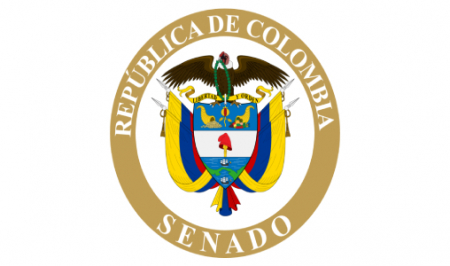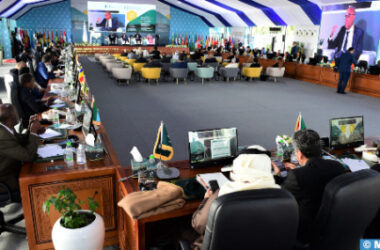This position of the Senate was expressed through a motion signed by an overwhelming majority of 62 senators out of 108 and representing the most important Colombian political parties, including some of the ruling coalition.
The motion was read on Tuesday in plenary session of the upper house, the most powerful of the Parliament, by the Secretary General of the Senate, Gregorio Eljach Pacheco, and broadcast live by the Senate TV channel, as well as on the social networks of the Congress.
“The undersigned Senators of the Republic of Colombia express our categorical rejection and total disagreement with the position adopted on August 10, 2022 by the Ministry of Foreign Relations, which reaffirmed the validity of a joint communiqué signed on February 27, 1985, with the self-proclaimed +sadr+,” the motion says.
“The decision taken by the Colombian Ministry of Foreign Relations last August, which goes against one of the fundamental principles of Colombian diplomacy, namely non-interference in the internal affairs of countries, has profound consequences and has ruined the excellent relations that we have always maintained and wish to continue to maintain with Morocco,” warned the signatories of the motion.
In this motion, initiated by Senator Germán Alcides Blanco Alvarez, member of the ruling Conservative Party and former president of the House of Representatives, the senators deeply deplored the decision “to re-establish diplomatic relations with this separatist movement that proclaims itself as a country, but which, in reality, is not recognized by the vast majority of the world’s countries, let alone by the United Nations.”
The representatives of nine parties in the Senate, from all ideological backgrounds, stressed that “this decision, which concerns the sovereignty and territorial integrity of Morocco, a country with which Colombia has maintained diplomatic relations for over 43 years, is paradoxical,” considering that “by unearthing a resolution dating back more than 37 years, it is clear that this decision was taken without assessing the current situation, nor measuring the consequences, deeply affecting the excellent ties of friendship that historically bind us to Morocco.”
The Kingdom is “a great friend and ally, which represents for Colombia a strategic and privileged partner in Africa and the Arab world, given its leadership and the recognition it enjoys at the regional, continental and global levels,” argues the motion, which was handed to the Moroccan ambassador to Colombia Farida Loudaya and will be submitted by the Senate to the Presidency of the Republic and the Ministry of Foreign Relations.
“Since 1985, the motion adds, the world has evolved, and so has the dispute over the Sahara, a matter that took a decisive turn in 2007, when Morocco presented the initiative for the negotiation of an autonomy statute for the Sahara region, in order to get out of the status quo and resolve a regional dispute that has lasted for almost half a century.”
In this regard, the Colombian senators pointed out that Colombia has maintained, for many decades, a constructive position, supporting Morocco’s efforts to achieve a just, lasting and mutually acceptable political solution on the basis of this Initiative, whose pre-eminence is enshrined in 18 resolutions of the United Nations Security Council since 2007, and which has been described as “serious, credible and realistic”, both by the Security Council and the International Community
The Colombian senators also welcomed that in recent years, relations between Colombia and Morocco have reached an optimal level and never seen before.
At the multilateral level, and particularly in the context of South-South cooperation, Morocco and Colombia have always shared a convergence of views on many regional and international issues of common interest.
“At the bilateral level, the high level of relations between our two countries has been translated into concrete and extremely beneficial facts for our two nations. Political, economic, social, tourist, academic and human ties have been strengthened through the agreements and conventions signed between Bogotá and Rabat, including the agreement on air services and the visa waiver agreement for holders of ordinary passports,” they said.
They added that Morocco “is the first African country to conclude a bilateral agreement with Colombia in this area, which not only opens the doors of Morocco to Colombians, but also allows Moroccans to visit Colombia, thus strengthening our national tourism.”
In addition, the Colombian senators highlighted “other agreements underway and which are of great importance to our country, in sectors as strategic as agriculture, renewable energy, railways, ports and crafts.
The senators who signed the motion represent nine Colombian political parties, including some of the coalition forming the Petro government: Conservative Party, Liberal Party, Party U (Social Party of National Unity) and the Green Alliance party.
Among the senators opposing Petro’s decision are also members of opposition parties such as the Democratic Center party, the Anti-Corruption Governors League party (party of Petro’s rival in the second round, Rodolfo Hernandez), and representatives of independent parties such as Radical Change, Mira Party and Colombia Justa Libres.










